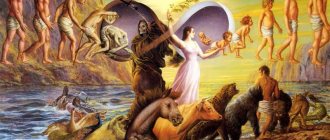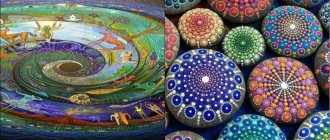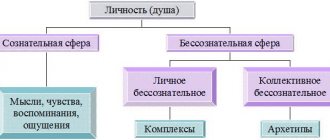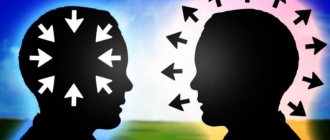Personality structure
The structure of a personality is the connection and interaction of its various components: abilities, volitional qualities, character, emotions, etc. These components are its properties and differences and are called “traits.” There are quite a lot of these features, and to structure them there is a division into levels:
- The lowest level of personality
is the sexual properties of the psyche, age-related, innate. - The second level of personality
is the individual manifestations of thinking, memory, abilities, sensations, perceptions, which depend on both innate factors and their development. - The third level of personality
is individual experience, which contains acquired knowledge, habits, abilities, and skills. This level is formed in the process of life and is social in nature. - The highest level of personality
is its orientation, which includes interests, desires, drives, inclinations, beliefs, views, ideals, worldviews, self-esteem, and character traits. This level is the most socially determined and formed under the influence of upbringing, and also more fully reflects the ideology of the society in which a person is located.
Why is it important and necessary to distinguish these levels from each other? At least in order to be able to objectively characterize any person (including yourself) as a person, to understand what level you are considering.
The differences between people are very multifaceted, because at each level there are differences in interests and beliefs, knowledge and experience, abilities and skills, character and temperament. It is for these reasons that it can be quite difficult to understand another person, to avoid contradictions and even conflicts. In order to understand yourself and others, you need to have a certain amount of psychological knowledge, and combine it with awareness and observation. And in this very specific issue, knowledge of key personality traits and their differences plays an important role.
Read also: Cedric Diggory / Cedric Diggory
Gender, name, profession and other role functions
The first thing that comes to mind for most is: “I am a person”, “I am a woman (man)”, “I am a businessman (turner, baker)”, “I am Tanya (Katya, Alexey)”, “I am a wife ( husband, daughter)”, etc. These are certainly funny answers. Your individual, unique “I” cannot be defined in general terms. There are a huge number of people in the world with the same characteristics, but they are not your “I”. Half of them are women (men), but they are not “I” either, people with the same professions seem to have their own “I”, not yours, the same can be said about wives (husbands), people of different professions, social status, nationalities, religions, etc. No affiliation with any group will explain to you what your individual “I” represents, because Consciousness is always personal. I am not qualities, qualities only belong to our “I”, because the qualities of the same person can change, but his “I” will remain unchanged.
Personality Traits and Properties
Personality traits or properties refer to human characteristics that denote the deep (internal) characteristics of a particular individual. This applies to both behavior in society and the ability to communicate, as well as a special response to various life situations in the aspect of long-term contacts. The nature of personality traits is both biological (innate) and situational (depending on circumstances).
Personality traits cannot be called physical qualities, social characteristics and titles, or temporary states. Conclusions based on a subjective attitude towards the personality of another person cannot be perceived as personal properties.
Related Concepts
The term “personality” is often used with words such as “person” and “individual”. In terms of their content, all these terms are not identical, but at the same time it is simply impossible to separate them from each other. The fact is that the analysis of each of these concepts allows us to more fully reveal the meaning of personality.
What is a person? This concept is referred to as generic. It indicates that a creature is at the highest level of development of nature. This concept affirms genetic predetermination in the development of human qualities and characteristics.
An individual is understood as an individual member of society, considered as a unique set of innate and acquired qualities that he has. Those specific properties and abilities that people have (consciousness and speech, labor activity, etc.) are not transmitted to them by biological heredity. They are formed throughout life through the assimilation of the culture that was created by previous generations. No person is capable of independently developing a system of concepts and logical thinking. To do this, he must participate in work and in various types of social activities. The result of this is the development of specific characteristics that were already previously formed by humanity. As living beings, people are subject to basic physiological and biological laws. If we consider their life from a social point of view, then here they are completely dependent on the development of social relations.
Another concept closely related to “personality” is “individual”. This term refers to a single representative of homo sapiens. In this capacity, all people have differences not only in their morphological characteristics (eye color, height, bodily constitution), but also in psychological properties, expressed in emotionality, temperament and abilities.
The term “individuality” is understood as the unity of a person’s unique personal properties. This concept means the uniqueness of the psychophysical structure of each of us, which includes the type of temperament, intelligence, mental and physical characteristics, life experience and worldview. This versatility of the concept of “individuality” is reduced to the designation of a person’s spiritual qualities, and its essence is associated with a person’s ability to be himself, showing autonomy and independence.
Basic personality types
One of the most popular personality typologies was developed by Swiss analytical psychologist Carl Gustav Jung. In his work as a practicing psychologist, Jung distinguishes two main personality types: extroverts and introverts. The typology differs depending on what a person is more focused on during his life: on external objects or on internal experiences. One can often mistakenly classify oneself as the opposite type due to the existing special tendency, which aims to compensate for one-sided actions.
Introduction
At the turn of the 19th and 20th centuries in psychology, at that time still a very young scientific discipline, a bright and significant direction arose that continues to exist and develop to this day - psychoanalysis.
The founder of psychoanalysis was the brilliant scientist, Austrian neurologist and psychiatrist Sigmund Freud (1856-1939). The fundamental difference between S. Freud’s theory and other areas of psychology of that time was the use of such an approach to the subject of science, in which the most important structural component of the psyche was its unconscious component (the unconscious, or “Id”). In other areas of psychology, the unconscious sphere of personality was not given much importance, or its existence was completely ignored. S. Freud's psychoanalytic theory, striking in its depth, had a highly significant impact on the scientific community contemporary to its author and even on some aspects of the development of civilization, especially on art. Many followers of S. Freud appeared - adherents of the theory of psychoanalysis.
However, some students of the founder of this theory did not share his views in everything. The most talented of them include the Austrian ophthalmologist and psychiatrist Alfred Adler (1870-1937) and the Swiss psychiatrist Carl Gustav Jung (1875-1961). Inspired by the theory of S. Freud, these scientists, based on it, created their own directions of psychoanalysis: A. Adler called his theory individual psychology, C. G. Jung - analytical psychology.
Due to the fact that C. G. Jung was a highly educated person and had extensive knowledge in various fields of scientific knowledge, the origins of analytical psychology lie not only in the psychoanalytic theory of S. Freud, but also in philosophy, mythology, cultural studies and many others.
This work is devoted to the study of analytical psychology by C. G. Jung.
Types of personality types according to Jung
The famous psychologist C. G. Jung developed one of the most accurate classifications of human personality, which is still used by most psychologists and psychiatrists. His approach involves assessing an individual according to 8 characteristics, which are arranged in pairs with opposite meanings. For example, one of the classification points is to determine a person’s extraversion or introversion. Another 6 criteria are combined as follows: irrationality and rationality, ethics and logic, intuition and sensory. By determining the psychological structure of a particular person, experts find out the person’s proximity to one of the parameters of the couple, and after that they leave a complete picture of the individual’s psyche.
Irrationality and rationality
Irrationals perceive reality only after the fact, without thinking about the past or future. They quickly adapt to environmental changes and make decisions based on current facts rather than experience. Such people know how to get out of unexpected difficult situations by activating their brain activity and quickly finding the right solution.
Personality types such as rationals are people who rely on solid life principles, experience, successes and failures of other people. This behavior causes the slowness of adaptation of rationals to changed conditions. However, in a stable environment, they are able to quickly make a decision and give a response to the situation, since they do not continuously analyze events, but use a ready-made reaction pattern. Rationalists can develop their thinking speed with the help of special BrainApps games.
Logic and ethics
One of the personality options of a modern person is an ethicist. Individuals of this type adhere to established dogmas and moral principles. They tend to be expressive in everyday speech, embellishing reality.
Read also: Excessive arching in the lower back
Logicians assess the situation objectively, focusing on facts. They evaluate each case separately, rather than choosing a solution that is typical for all options. Ethics among logicians is not well developed, which is why people of these types interact poorly with each other.
Sensory and intuition
The intuitive perception of reality is quite weak. Such individuals are prone to absent-mindedness and uncertainty. They constantly hover in the past, make assumptions about the future, but they are not enough for the present. Special articles on the BraonApps blog will help improve your ability to fully perceive the surrounding reality, and improving your attention can be achieved by playing simple and interesting games.
People of the sensory type perceive reality in the present, therefore they live by sensations. They clearly perceive themselves and are more deeply imbued with the world around them. Their sensitivity is directed not only to mental matters, but also to physiological needs.
Does consciousness consist of nerve cells?
Materialism is accustomed to decomposing the entire multidimensional world into mechanical components, “testing harmony with algebra” (A.S. Pushkin). The most naive misconception of militant materialism regarding personality is the idea that personality is a set of biological qualities. However, the combination of impersonal objects, be they even atoms or neurons, cannot give rise to a personality and its core - the “I”.
How can this most complex “I”, feeling, capable of experiences, love, be simply the sum of specific cells of the body along with the ongoing biochemical and bioelectric processes? How can these processes shape the “I”???
Provided that nerve cells constituted our “I”, then we would lose part of our “I” every day. With each dead cell, with each neuron, the “I” would become smaller and smaller. With cell restoration, it would increase in size.
Scientific studies conducted in different countries of the world prove that nerve cells, like all other cells of the human body, are capable of regeneration (restoration). Here is what the most serious biological international journal Nature writes: “Employees of the Californian Institute for Biological Research named after. Salk discovered that in the brains of adult mammals, fully functional young cells are born that function on a par with existing neurons. Professor Frederick Gage and his colleagues also concluded that brain tissue renews itself most rapidly in physically active animals." 1
This is confirmed by a publication in another biological journal, Science: “Over the past two years, researchers have found that nerve and brain cells are renewed, like others in the human body. The body is capable of repairing disorders related to the nervous tract itself, says scientist Helen M. Blon.”
Thus, even with a complete change of all (including nerve) cells of the body, the “I” of a person remains the same, therefore, it does not belong to the constantly changing material body.
For some reason, in our time it is so difficult to prove what was obvious and understandable to the ancients. The Roman Neoplatonist philosopher Plotinus, who lived in the 3rd century, wrote: “It is absurd to assume that since none of the parts has life, then life can be created by their totality... moreover, it is completely impossible for life to be produced by a heap of parts, and that the mind was generated by that which is devoid of mind. If anyone objects that this is not so, but that in fact the soul is formed by atoms coming together, that is, bodies indivisible into parts, then he will be refuted by the fact that the atoms themselves only lie one next to the other, not forming a living whole, for unity and joint feeling cannot be obtained from bodies that are insensitive and incapable of unification; but the soul feels itself”2.
The “I” is the unchanging core of personality, which includes many variables, but is not itself variable.
A skeptic can put forward a last desperate argument: “Maybe “I” is the brain?”
Human personality types depending on orientation
First of all, the psychological structure of personality implies a person’s orientation towards himself or the outside world. This parameter largely allows us to assume or even determine a person’s reaction in a given situation, thereby typing it according to other classifications.
Introverts
A distinctive feature of introverts is their focus on the inner world. They are characterized by worries and self-doubts. Such people have difficulty contacting the social environment, feel uncomfortable among the crowd, and prefer loneliness to noisy companies. In psychology, there is a direct dependence of personality types on this parameter.
Extroverts
Focus on the outside world is typical for extroverts. Such people not only love to be among people, the social factor is the most important need. Extroverts need contact with individuals and constant communication. They are open emotionally and psychologically, so they easily integrate into society.
In modern society you will not meet people who can be classified as a specific type of orientation. Pure extroverts and introverts are extremely rare and are often not a variant of the norm.
What else do psychologists advise?
According to experts, when a woman asks whether a man loves her, she may be hiding certain hidden psychological problems.
There are two similar problems:
- she has low self-esteem, lacks self-confidence;
- at the subconscious level, the girl believes that it is she who is to blame for the problems in her relationship with her beloved guy.
In the first situation, you should resort to self-improvement. However, this is not done for the sake of a loved one, not for the environment, and not for the reason that this is the advice of a qualified psychologist. She must do it personally for herself and on her own initiative.
Only when you change your sense of self will the constant doubts, comparisons of yourself with others stop, and there will be no attempts to appear better to others. If uncertainty goes away, then there will be no point in posing the question under consideration.
In the second case, psychologists try to find out what exactly is the reason for such a destructive attitude. Perhaps the culprit is excessive emotionality, which leads to conflict situations, or the acquired negative life experience is taking its toll.
Sometimes even the fact that a woman completely “dissolves” in her beloved does not always mean that the relationship between them is harmonious. Analysis of a specific case occurs on an individual basis.
In 7 out of 9 cases, “testing” a loved one leads to the collapse of the relationship
With a certain periodicity, there is a desire to check up on your young man, but you should not joke with such methods. Sometimes the manifestation of such an initiative, even if such a “test” is successfully passed, destroys even the couple’s relationship built over the years.
Most men will take this as a serious insult and a woman showing confidence in his unreliability, especially if the feelings are truly sincere. You should be extremely careful with such methods, otherwise you will lose everything.
Differences between the concepts of personality, individual and individuality
These three concepts are quite close, and each of them can be used to emphasize that we are talking about a specific person. However, they all differ somewhat in meaning. Let's look at each concept in more detail.
- An individual is simply a unique person, like a character in a movie or story. For example, having met a new neighbor, you still do not know anything about him as a person or individual, but you can already quite identify him as an individual.
- Individuality is a system of psychological and behavioral characteristics of an individual, temperament, and communication style. Simply put, it is a set of qualities that distinguishes him from other people.
- Personality is the inner content of a person, realized in interaction with the outside world. A personality can be called an accomplished person who is unique for a reason, but because he has already formed an internal “core”. Sometimes the concepts of “individuality” and “personality” are identified.
Essentially, every person becomes an individual at the moment of birth. Gradually he grows, a certain character is formed, and individuality appears. As social experience accumulates, norms of morality and morality are formed, and principles of behavior are developed. It is these qualities that make him a person.
And again about suicide
Most suicides believe that their Consciousness will cease to exist after death, that it will be peace, a break from life. We got acquainted with the conclusion of world science about what Consciousness is and about the lack of connection between it and the brain, as well as the fact that after the death of the body, a person will begin another, postmortem life. Moreover, Consciousness retains its qualities, memory, and its afterlife is a natural continuation of earthly life.
This means that if here, in earthly life, Consciousness was struck by some kind of pain, illness, grief, liberation from the body will not be liberation from this illness. In the afterlife, the fate of a sick consciousness is even sadder than in earthly life, because in earthly life we can change everything or almost everything - with the participation of our will, the help of other people, new knowledge, changing the life situation - in another world such opportunities are absent, and therefore the state of Consciousness is more stable.
That is, suicide is the preservation of a painful, unbearable state of one’s Consciousness for an indefinite period. Quite possibly - forever. And the lack of hope for improving your condition greatly increases the painfulness of any torment.
If we really want rest and pleasant peaceful rest, then our Consciousness must achieve such a state even in earthly life, then after natural death it will retain it.
The author would like for you, after reading the material, to try to find the truth on your own, double-check the data presented in this article, and read the relevant literature from the field of medicine, psychology and neurophysiology.
Personality structure according to Rubinstein
According to Rubinstein, personality has three components. The first component is directionality. The structure of orientation consists of needs, beliefs, interests, motives, behavior and worldview. A person’s orientation expresses his self-concept and social essence, orients a person’s activity and activity regardless of specific environmental conditions.
The second component consists of knowledge, ability and skills, the main means of activity that a person acquires in the process of cognitive and objective activity. Having knowledge helps a person to navigate well in the outside world; skills ensure the execution of certain activities. Skills help achieve results in new areas of subject activity; they can be transformed into abilities.
Individual - typological properties constitute the third component of personality; they manifest themselves in character, temperament and abilities, which ensure the originality of a person, the uniqueness of his personality and determine behavior.
The unity of all substructures ensures adequate functioning of a person in society and his mental health.
Also in a person, it is possible to determine certain levels of organization that implement it as a subject of life. Living standard - it includes life experience, moral standards, and worldview. The personal level consists of individual characterological features. The mental level consists of mental processes and their activity and specificity.
For Rubinstein, personality is formed through interaction with the world and society. The core of personality includes the motives of conscious actions, but also, a person has unconscious motives.
Mental and physiological characteristics
Some say that their “I” is their reflexes, their behavior, their individual ideas and preferences, their psychological characteristics, etc.
In fact, this cannot be the core of the personality, which is called “I.” Why? Because throughout life, behavior, ideas and preferences change, and even more so psychological characteristics. It cannot be said that if these features were different before, then it was not my “I”.
Realizing this, some people make the following argument: “I am my individual body.” This is already more interesting. Let's examine this assumption as well.
Everyone knows from the school anatomy course that the cells of our body are gradually renewed throughout life. Old ones die (apoptosis), and new ones are born. Some cells (the epithelium of the gastrointestinal tract) are completely renewed almost every day, but there are cells that go through their life cycle much longer. On average, every 5 years all the cells of the body are renewed. If we consider the “I” to be a simple collection of human cells, then the result will be absurd. It turns out that if a person lives, for example, 70 years. During this time, at least 10 times a person will change all the cells in his body (i.e. 10 generations). Could this mean that not one person, but 10 different people lived their 70-year life? Isn't that pretty stupid? We conclude that “I” cannot be a body, because the body is not permanent, but “I” is permanent.
This means that the “I” cannot be either the qualities of cells or their totality.
But here the particularly erudite give a counter-argument: “Okay, with bones and muscles it’s clear, this really cannot be “I,” but there are nerve cells! And they are alone for the rest of their lives. Maybe “I” is the sum of nerve cells?”
Let's think about this question together...
Jung's Major Archetypes
It is logical that the number of archetypes should be equal to the number of typical (repeating, similar) situations in our lives, from which it is clear that we are talking about virtually unlimited quantities. However, Jung highlighted only a few of the most important of them: the mask (persona), anima, animus, shadow and self.
It is this set of archetypes that takes a special part in the formation of personality, largely determining its structure (see figure).
MASK (person). One of the most important archetypes for a person, the name speaks for itself. The mask is that part of our consciousness that is addressed to society. It is through it that interaction with society occurs. For each social situation, each person has his own type of mask. The function of the mask is to imitate a socially acceptable image of ourselves, as well as to hide what we really are. The mask is a very important part of our personality, which is responsible for a successful social life, but, like any useful thing, it carries within itself both good and evil. Often the mask begins to play such a big role for most of us that we completely forget who we really are, which means that we fall under the power of a skillful tool that quietly enslaves us. From what has been said, it is easy to conclude that the MASK (PERSONA) is an archetype that is in the process of constant change, the essence of which is to constantly adapt to new circumstances.
SHADOW. What is responsible for the “primitive” animal part of our personality, the shadow, is our natural impulses (selfish, sexual, aggressive), which, for various reasons, are not accepted either by society or by ourselves. Accordingly, we tend to suppress its natural manifestations. However, Jung himself considered the Shadow to be twofold in essence. On the one hand, it presents obvious problems for the individual, on the other hand, it is a powerful source of universal energy that can be used for “peaceful purposes”, for example, directing its energy into a creative direction .
According to Jung, both the Shadow and the Persona are special archetypes and are a kind of basic structure (core) in the collective unconscious. The reason for this view is probably that these archetypes, unlike the others, are responsible for the self-awareness of the individual, and therefore, both one and the other manifest themselves both in the personal unconscious and directly in consciousness. The role of the Ego is to create there is a certain semblance of harmony between the Shadow and the Persona. This means directing the enormous energy of the Shadow in the right direction. On the other hand, this means using the Persona as a practical tool for living in society, without identifying with it.
ANIMA and ANIMUS. These two archetypes are associated with the images of the Father and Mother, man and woman. For a man, the Anima image is an ideal, associated, on the one hand, with the mother, on the other, carrying the unconscious feminine side of male nature, as well as ideas about the ideal woman, which to a large extent influence in the search for a partner. Typical manifestations of Anima in a male character are excessive emotionality, sensuality, irrational impulsiveness. Ignoring the feminine side of one’s nature leads to a certain disharmony in the development of a male personality and the loss of certain opportunities.
For a woman, the Animus is the image of an ideal man, partner, father, as well as the masculine part of her personality. Manifestations of the animus in a female character are aggressiveness in society and family, the desire for dominance, independence, logic. Just as in the case of a man, ignoring or rejecting the male part of the personality leads to one-sided development.
SELF. (I am who I am). Not manifested under ordinary conditions, this archetype becomes the center of the entire personal structure after a special act, which Jung called INDIVIDUATION. Individuation of a personality occurs when all its internal structures, which are in ordinary conditions in antagonism, come into balance and are united in one integral harmony. Only then does the Self become the defining archetype of personality. Jung believed that self-actualization of the Self is a very rare phenomenon, nevertheless, it is the main goal of human existence. According to Jung, the Self is the embodiment of our natural religiosity and subconsciously pushes a person to develop inner harmony.








